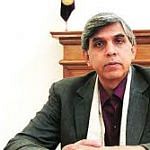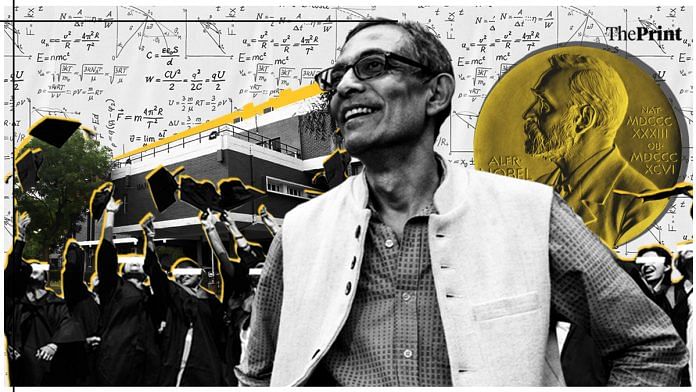Indian-American Abhijit Banerjee won the 2019 Nobel Prize in Economics along with economists Esther Duflo and Michael Kremer. Banerjee is the second Nobel laureate of Indian origin after Amartya Sen, who won the award in Economics in 1998. Banerjee, a JNU graduate, is a professor at MIT and had received his PhD from Harvard University in 1988.
ThePrint asks: Abhijit Banerjee’s Nobel in the US: Is it a comment on the quality of Indian institutions?
One doesn’t become Nobel laureate overnight; Indian institutes must constantly nurture researchers, teachers
 Dinesh Singh
Dinesh Singh
Former V-C, Delhi University
There are severe drawbacks of our academic institutions that prevent an Indian from winning a Nobel Prize. Remember, brilliant minds do not become Nobel laureates overnight.
An institution and its traditions must be designed to nurture not just one individual, but the entire ecosystem. This means that institutions must be given freedom to not only recognise talent, but also attract and nurture it. Thus, academic institutions in India need freedom, support and sterling leadership.
When Nobel Prize-nominated astrophysicist Meghnad Saha resigned from the Allahabad University, then Vice-Chancellor A.N. Jha got Austrian scientist and Nobel laureate Erwin Schrodinger as the next professor.
Hypothetically speaking, had the revered mathematician Srinivasa Ramanujan turned up during my recent tenure as the Vice Chancellor of Delhi University, UGC regulations would have prevented me from admitting him as a student, let alone granting him a degree or a job. The University of Cambridge gave him a PhD and a job straight away without making a fuss about his formal credentials.
Har Gobind Khorana was rejected by the Delhi University for a lecturer’s position. The University Grants Commission has over the years become more and more detrimental to genuine academic nurturing. For instance, the UGC prescribes a common syllabus for all universities in India. Without academic diversity, institutions shall lose vigour and be reduced to abject mediocrity.
The UGC appoints Vice-Chancellors through highly restrictive regulations. Even Hansa Jivraj Mehta, one of India’s most admired education reformists, would under current regulations be ineligible to be even considered for the post of a V-C.
Rather than castigate Indian education system, we need to understand what can be done to subvert this trend
 Manisha Priyam
Manisha Priyam
Political analyst, researcher and academic
If Amartya Sen is the grand philosopher, then Abhijit Banerjee and Esther Duflo have been engaged with the granular on the ground. Their work on issues of poverty and development is reflective of research done on the ground. Although known for Randomised Control Trials or RCTs, they have also been lauded for their commitment to addressing concerns of poverty and development. There has never been a feeling that they belong to an institution of power. Their humility is characteristic of their work.
When it comes to Indian institutions, the question remains — are we tolerant of criticism? It’s not a problem with the education system in India that has encouraged them to leave and work outside the country. The education system in the US thrives on federal grants. It is important to understand that knowledge-making partly also develops when one challenges established norms. Knowledge is about speaking truth to those in power. This begs the question: Do we as a society want to be people who harbour knowledge?
Rather than castigating the Indian education system, we need to understand what more can be done to subvert this trend. If we think Indian universities foster enough erudite and talented teachers, we must ask if these same individuals are also doing research work. There is clearly a gap here and we must find out how this can be bridged.
I feel strongly that research done on India is not as widely discussed within the country as it is by scholars outside, working on India.
Also read: Indian economy heading towards disaster, Abhijit Banerjee said days before winning Nobel
Elite institutes like IITs, IIMs are few in numbers and unable to foster a world-class research culture
 Prithvi Datta Chandra Shobhi
Prithvi Datta Chandra Shobhi
Professor, Krea University
Consider this paradox: Indians celebrate when one of their own becomes the dean at a prestigious American university at the age of 35, but ignore that most of their young academics can’t find university jobs back home even at the age of 40.
The issue isn’t simply the irregular, arbitrary, often corrupt and invariably politicised university recruitment, which is an important contributing factor in the dismal state of the Indian higher education institutions (HEIs).
The issue is that Indian HEIs see their faculty members not as individual talents who are capable of producing world-class research but as indistinct, replaceable beings to be used for clerical purposes.
So, autonomy and control over one’s schedule that a researcher requires, which is perhaps even more important than having resources, aren’t recognised as crucial to building a robust research culture. It is absolutely critical for an individual faculty member to be given the autonomy of organising his or her own research and teaching agenda.
No wonder then the heterodoxy of thought, which produces new questions and ideas, isn’t sustained by Indian HEIs. There are very few truly elite institutions like the IISc, IITs and IIMs and they are unable to foster a genuinely world-class research culture. In comparison, any major western city like Boston or London will have more research institutes than all of India combined. Therefore, the IISc will look to the West than collaborate with other Indian institutions on a research project.
Until Indian academics are given control over their schedule, research agenda and, perhaps, adequate resources to conduct research, we will continue to see them flourish elsewhere.
India produces many brilliant intellectuals, but they don’t get recognition in their country
 Abhijit Sen
Abhijit Sen
Former member of the Planning Commission of India and professor at JNU
There are two sides to this question. First, have Indian institutes done well in terms of producing people capable of winning the Nobel Prize or scaling similar heights? Clearly, they have. Abhijit Banerjee was a student at Kolkata’s Presidency College and New Delhi’s JNU and has maintained links with both these institutions.
India keeps producing talented individuals but many of them are not widely known. One might say that Abhijit Banerjee was in India many years ago, but what about the situation now? It is probably not as good as it was back then, but it can’t be called bad either.
The second question is: Why do they move to other countries and win Nobel Prizes there? It could possibly be because most intellectuals are comfortable getting a job abroad, which pays them more. Moreover, having academic connections also matters. It doesn’t demand too much to maintain contact with India while working abroad.
Academic institutions in the US and Europe are qualitatively better than those in India. There are more people under one roof, more seminars to attend, and better labs and resources to work with.
Also read: Economics Nobel for Abhijit Banerjee celebrates asking the right questions
Abhijit Banerjee’s Nobel win shows Indian institutions producing outstanding scholars but unable to retain them
 Gilles Verniers
Gilles Verniers
Co-Director, Trivedi Centre for Political Data and assistant professor, Ashoka University
The attribution of the 2019 Nobel Prize in Economics to Abhijit Banerjee is yet another illustration of the ability of Indian public universities to produce outstanding scholars, but also of their inability to retain them in India.
The world’s most prestigious universities abroad obviously offer opportunities and resources that are hard if not impossible to match, but the institutional weakness of Indian universities has been a major push factor that has led India to lose considerable talent.
The career trajectory of Abhijit Banerjee shows, however, how the circulation of talent can still benefit India, which has been the site of most of his research, alongside Esther Duflo and generations of young economists trained under them.
But for one Abhijit Banerjee, there are dozens of scholars who could contribute to address India’s problems, just that they are lacking adequate incentives and opportunities. The current onslaught on Banerjee’s alma mater, JNU, only reinforces that state of affairs.
To be fair, this is not a singular Indian problem. The Nobel, and other prestigious academic awards, tend to favour scholars located in highly ranked institutions in the West. This is not just the result of their ability to attract the best minds; it also points to the asymmetry in resources and recognition that these universities provide.
India should learn from neighbours like China & South Korea how to develop good academic institutes
 Neelajan Sircar
Neelajan Sircar
Senior Visiting Fellow, Centre for Policy Research
The Nobel Prize is an extraordinary achievement and very few institutions in the world, Indian or otherwise, should be expected to regularly generate Nobel laureates.
Furthermore, economics is a reasonably insular discipline, so the Nobel Prize for Economics is unlikely to be given to academics outside a small number of institutions.
When we think about the quality of Indian academic institutions, we are referring to more general measures of faculty and research quality, like citations of work. In these measures, the quality of Indian higher education is rapidly declining, which is a serious cause of concern. The United States is replete with high-quality universities and research institutions, and is far ahead of other countries in terms of academic quality. But this does not seem like a reasonable goal for India’s higher education system.
India should look to our neighbours, like China and South Korea, which have rapidly built good universities, in thinking about how to develop good academic institutions.
Political interference, be it from the Left or the Right, has hurt Indian universities. Ideally, academics should have no political interference, so that educationists can teach and researchers can research in peace. Sadly, we are far from this realisation today.
Also read: Nobel for Abhijit Banerjee and co shows how Economics as a discipline is changing
By Taran Deol, journalist at ThePrint




It is also important that educationists and academicians, do not take part in politics, and refrain from making any comments. In the west, one never hears any Professor making comments on government policies unless it is related to education. But Indian Professors publicly express their political opinion which do not speak well for their professional ethics expected of them.
Consider some recent HRD ministers. The fact that Maharashtra now has 68% reservation. The overpowering claim of ideology over institutions designed for autonomy. The pay and benefits Indian academics receive, in relation to those working in Ivy League colleges. Not a system designed to foster talent or excellence. 2. Dr Abhijit Banerjee’s achievement shows the quality of human capital that is available in the country. We should be doing more to sustain and support it, also retain it at home. If, instead, we consider our epics to be th3 repository of all human learning and wisdom, we can take pride in someone who is 100% a US citizen.